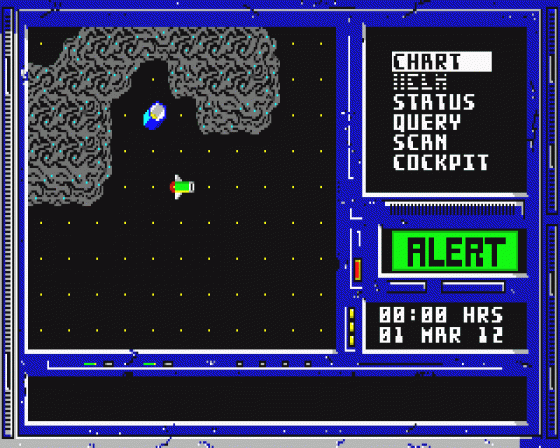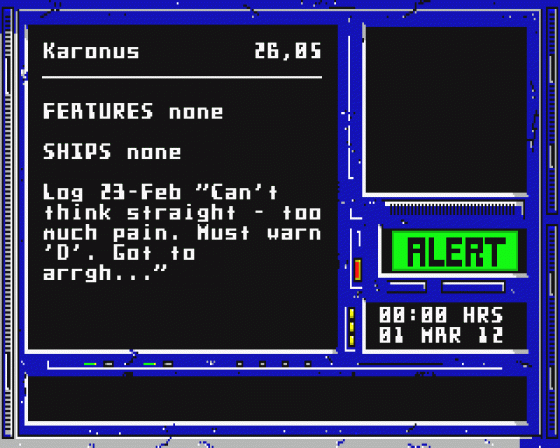
ST Format
 1st December 1990
1st December 1990
Categories: Review: Software
Author: Sean Masterson
Publisher: Origin
Machine: Atari ST
Published in ST Format #16
Space Rogue
Strange that an SF game can give you a feeling of deja vu. Space Rogue reminds you of an interstellar trader called Jameson. You should remember - it was one of the most successful games ever. That game was Elite, of course, and it seems that when the boys at Origin played it, they liked it so much they rewrote it. An outrageous accusation? Read on!
The plot is simple. You're working the graveyard shift on a small commercial starship. At the beginning of what should be another forgettable shift, your ship detects the presence of a wrecked vessel in nearby space. Since all the dirty work falls to you, you don spacesuit and zip over to the mysterious hulk. Inexplicably, it's in fine condition but there is no crew on board. Before you can get in touch with your superiors to let them know all this, a pirate vessel appears from nowhere, blasts your mothership into micro-meteorites and obligingly departs without bothering to check the ship you're on. Bingo. Have starship, will travel.
Your first task is to get back to civilisation, which is easy because the Quickstart section of the player's manual sends you straight to the nearest space station. Remember the space station docking sequence that made Elite famous? So do the guys at Origin. Theirs, however, is much easier than its uncredited predecessor, so you won't be re-starting right from the word go. During the course of the game, however, there are several different types of space station to dock with and the procedure is different for each.

In fact, Space Rogue is a game you have to figure out how to play, despite the extensive and evocative documentation that accompanies it. Exploring space stations on foot, earning your pilot's licence (so you can buy weaponry for your vessel) and trading between the stars are all necessary apprenticeships you have to serve before getting involved in the plot - yet another tediously interwoven scam from which your character can't escape because, as usual, he ends up being the focal point of it. You do get an option, however, at the outset: the opening sequence is tagged comic book fashion onto the front end of the game, leaving you the choice of starting from scratch or loading a saved game.
Control options are keyboard, joystick, mouse or any combination of the three - which is fine, since apart from space flight, every task you face is of the point and click variety. In space you can use auto-pilot for long distances or roll and loop your vessel from point to point - and probably roll much more than you intend to: the keyboard controls are so hyper-sensitive that the ship is completely uncontrollable. Interplanetary space is disappointingly two-dimensional, but travelling through interstellar space is completely different and much more fun: you have to steer through a "wormhole" - a series of offset disconnected rings between two systems.
Space Rogue is enormous, spanning enough territory to make the most travelled SunDog vet feel like a couch potato. Players familiar with other Origin SF games will recognise this universe as the one Origin have been fleshing out for some time. But I wonder how many people bother with that endlessly elaborated universe and play games like this to the end.
Effects

The opening sequence runs in medium resolution and is neatly stepped for emphasis. You can avoid it only if you play a saved game. The rest of the graphics are acceptable but by no means state-of-the-art. Smooth, filled 3D vectors are the stuff of short range space travel, while two-dimensional system maps are quaintly displayed with spinning globes and glowing clouds of dust. Movement on foot is the least impressive, being of the 'get your character to follow the pointer' type over a squashed plan view, but even this follows the line-of-sight philosophy so eagerly adopted by Origin years ago - in other words, your character can't see what's on the other side of a closed door. As for sound: forget it.
Verdict
Almost unplayable. Space Rogue is slow, tortuously so in some respects. The pointer movement is frustrating jerky, and the knock-on effect of crippling such a simple feature is devastating.
The scenario lifts some of the best features of Elite and SunDog but ties them together so clumsily that, despite the wealth of data, you're left feeling unimpressed. Most annoying is the way the slick packaging and documentation try to camouflage Origin's shoddiness by pleading with you to get engrossed in the greater scheme of things. No. You should have to work at a game to beat it, not just play it.
Other Atari ST Game Reviews By Sean Masterson
Scores
Atari ST Version| Graphics | 40% |
| Sound | 10% |
| Intelligence | 70% |
| Instant Appeal | 30% |
| Lastability | 30% |
| Overall | 30% |








